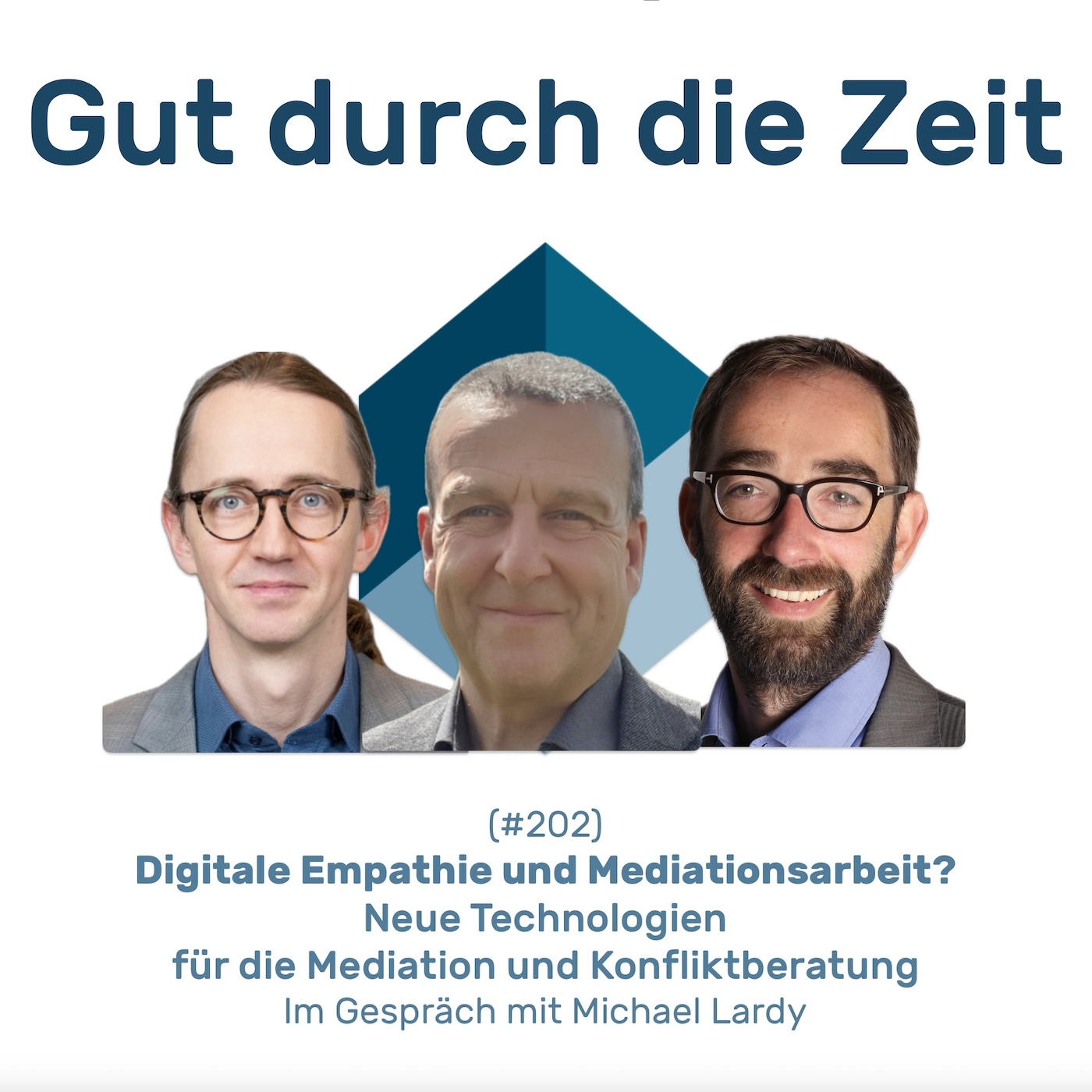INKOVEMA Podcast „Well through time“
#202 GddZ – Digitised empathy and mediation work?
New technologies for mediation and conflict counselling. Part 7
In conversation with Michael Lardy
Michael Lardy: Mediator from Salzburg, Austria. He completed a law degree at the University of Salzburg from 2020 to 2024. In addition, he completed a diploma course to become a mediator at Wifi Salzburg between 2022 and 2023. Lardy specialises in family mediation and divorce mediation. He has also worked on the topic of artificial intelligence in mediation and has published an article entitled „Mediation and AI: The Silent Revolution – How Human is ChatGPT?“.
Well through time.
The podcast about mediation, conflict coaching and organisational consulting.
Contents
Chapter
0:03 – Introduction to the new technology
0:57 – Exciting developments in mediation
1:50 – Michael Lardy on the podcast
2:28 – The influence of AI on mediation
6:55 – Empathy and AI: A critical view
8:41 – Humanisation of technology
11:16 – The role of language in communication
15:10 – Trust in AI: opportunities and risks
18:40 – The future of AI in mediation
21:21 – Vision of an AI co-mediator
24:58 – Open LLMs: The next revolution?
28:22 – Requirements for future AI models
32:14 – Low-threshold access to mediation
36:13 – International perspectives on mediation
39:50 – Conclusion and outlook for the future
Summary of content
This episode of the podcast "Gut durch die Zeit" is all about the integration of new technologies in the field of mediation and conflict resolution. I, Sascha Weigel, and my colleague Dr Frank Termer reflect on the challenges and opportunities associated with the use of Artificial Intelligence (AI), in particular ChatGPT, in mediation. We discuss not only what is technologically possible, but also how such innovations could change the realities of mediation in practice.
Frank and I open the conversation by discussing current events that are influencing not only the political landscape but also our work as mediators. We emphasise the need to respond proactively to upcoming challenges without losing sight of the rapid pace of technological development. Our guest is mediator Michael Lardy from Salzburg, who gained early experience with AI technologies. Michael brings interesting perspectives on how artificial intelligence could revolutionise the way we resolve disputes.
A particular focus is on the question, How empathetic AI is and whether it can come close to human empathy. From a scientific perspective, we examine various studies that show that AI is capable of acting empathetically, at least in the perception of users. This leads to the important question: Are we humanising the technology and projecting human characteristics onto it, or does AI actually have the potential to act empathetically? This discrepancy is a central point of our discussion.
Michael Lardy shares his experiences from his practice and emphasises the potential of using AI in mediation, such as the possibility of going through role-specific training through AI-supported simulations. We also look at how AIs could facilitate access to mediation by acting as a first point of contact and helping people to better understand and navigate conflicts in advance.
In addition, we discuss the challenges and concerns regarding the ethical use of AI and the need to create the right framework for AI to be accepted in mediation. We analyse the extent to which mediators should retain control over the technology to ensure that the human connection remains in the process.
Finally, we discuss how important it is not only to be consumers of technology in the context of digital transformation, but also to actively develop strategies to optimise our own skills and those of the technologies. We educate ourselves together in order to better shape the future of mediation and suggest that low-threshold access to mediation should be opened up through AI-supported solutions.
This episode is a fascinating dive into the development and challenges that AI brings to our industry. It is thought-provoking about the role of technology in our work and how we can use it to benefit those seeking support in conflict situations.
Full transcript of the episode




A very exciting podcast that provides a very good insight into the opportunities of AI integration in mediation.
Thanks for the food for thought :)
Thank you very much for your feedback! I'm delighted that this podcast has helped you. Why don't you also take a look at our KO Compass?